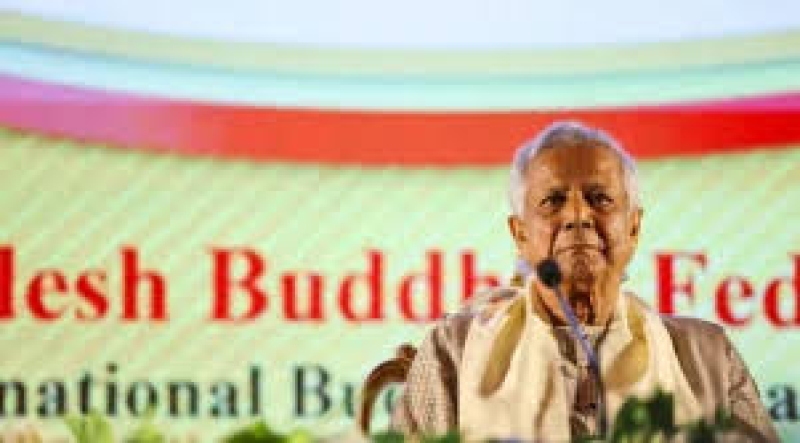- Puppet show enchants Children as Boi Mela comes alive on day 2 |
- DSCC Admin Salam’s drive to make South Dhaka a ‘clean city’ |
- 274 Taliban Dead, 55 Pakistan Troops Killed |
- Now 'open war' with Afghanistan after latest strikes |
- Dhaka's air quality fourth worst in world on Friday morning |
Pahela Baishakh Symbolizes Our Harmony: Chief Adviser

Chief Adviser Professor Muhammad Yunus on Sunday described Pahela Baishakh as a powerful symbol of national harmony, extending greetings to the nation on the eve of the Bengali New Year.
“Pahela Baishakh reflects the unity in our diversity,” he said at a ‘Sampriti’ (Harmony) assembly after laying the foundation stone of the Sampriti Bhaban at the International Buddhist Monastery in Dhaka. “Though our beliefs, religions, and customs differ, we are all members of one family. Everyone will celebrate the new year in their own way, but together, as part of one universal festival.”
He emphasized Bangladesh's rich mosaic of cultures, stating: “Hindus, Muslims, Buddhists, Christians—people of the hills and plains—all contribute to our shared heritage of languages, traditions, and values.”
The event was attended by Religious Affairs Adviser Dr AFM Khalid Hossain, Chattogram Hill Tracts Affairs Adviser Supradip Chakma, Army Chief General Waker-Uz-Zaman, and other dignitaries. The Bangladesh Buddhist Federation hosted the program, chaired by Venerable Dharmapriya Mahathera, Deputy Chief Patriarch of the Buddhist Sangha Council.
In his address, Prof Yunus highlighted the historic and cultural importance of Buddhist monasteries, calling them ancient centers of education and welfare. “These monasteries welcomed monks and students from afar, spreading the teachings of the Buddha—peace, harmony, and compassion,” he said.
He cited Atish Dipankar, the renowned Buddhist scholar from Bengal who carried the Buddha’s message to Tibet. “Even today, the Chinese people honor him with deep respect,” he said, adding that such legacies are vital parts of human civilization.
Prof Yunus praised the International Buddhist Monastery as a living symbol of communal harmony in Bangladesh. He lauded its role in promoting education, cultural preservation, and social welfare in line with the Buddhist values of non-violence and equality.
He expressed hope that the newly-launched Sampriti Bhaban would further uphold Bangladesh’s tradition of peace and inclusivity both at home and abroad.
Recalling his recent visit to China, Prof Yunus shared that he had mentioned Atish Dipankar in every bilateral meeting, underscoring the shared cultural bonds between the two countries.
Earlier in the day, he visited the monastery’s main Prayer Hall and laid the foundation stone of Sampriti Bhaban, a project to be built by the Bangladesh Army. He remarked that despite living only 10 kilometers away, he had not known such a beautiful place existed in the city.
Top officials of the Navy, Air Force, diplomats, and Buddhist community leaders were also present at the ceremony.

